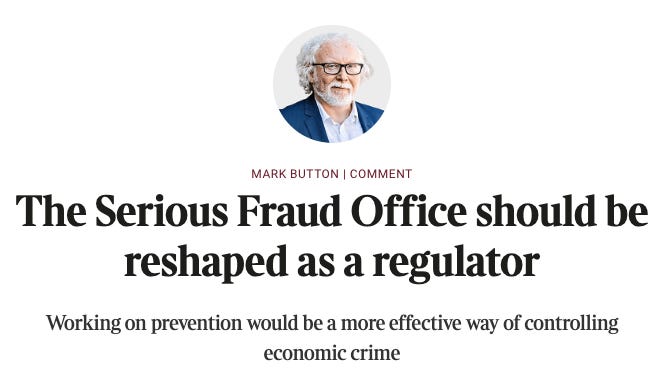Nanny state threatens pubs
... and can we reform Capital Gains Tax to go for growth?
Rumours abound that the government will raise capital gains tax in its October budget, possibly aligning marginal tax rates with those for income tax. That would mean the (standard) top rate on capital gains rising from 20 to 45 percent, and basic rate taxpayers paying 20 rather than 10 percent.
Sometimes people argue that such an approach must be acceptable to free marketeers, since it's the one Nigel Lawson took in his famous 1988 budget. I'm often told that investors cheered as the top marginal rate rose from 30 to 40 percent.
Perhaps so, but there are important differences between then and now to bear in mind. Crucially, inflation was generally (and persistently) much higher in those days, which meant that people frequently paid tax on purely paper gains. As well as aligning capital gains and income tax rates, Lawson indexed gains to inflation and effectively wrote off any gains made before 1982. In the same budget, the top rate of income tax fell from 60 to 40 percent. You can see why the City was pleased.
The contemporary appeal to Lawson and 1988 is not, then, as compelling as people seem to think. And of course there are genuine problems with capital gains tax, mostly stemming from the way it distorts economic decision-making. For one thing, when CGT increases are expected, people may rush to realise their gains before the tax rate rises. That might lead to a bump in revenues before the announcement but, perversely, lower revenues once the tax rate goes up.
This phenomenon is compounded by the so-called "lock-in effect" – people deciding not to realise capital gains (when they otherwise would) in the hope of a lower tax rate in future. The extreme version of this is holding assets until death, at which point historic gains are usually written off (inheritance tax is obviously a complicating factor).
To counter these effects, some economists favour a "mark-to-market" CGT, in which people pay tax on increases in the value of their portfolio, whether those gains are realised or not. Portfolio losses would attract tax relief. But this has never struck me as a workable alternative in the real world – not least because many assets are quite difficult to value until they are sold on the open market.
Besides, it doesn't deal with the biggest economic problem with taxing capital gains – that it introduces a systematic bias against saving and investment into the tax system, favouring present consumption over future consumption, and thereby undermines long-run growth. (I explain these "double taxation" dynamics in more detail here.)
From a pro-growth perspective, I think there are three potential ways forward. First, we could simply decide not to tax capital gains at all. Some other countries take this approach, at least for the main asset classes like shares. You would have to rigorously police the sometimes blurry border between income and gains, however, and the politics would be tricky.
Second, you could have a simplified, preferential tax regime that just taxed capital gains at a low, flat rate. This is roughly what Alastair Darling tried to do as Chancellor in 2008. It's an expedient and practical approach, but it doesn't really address the problems outlined above.
The third, and I think best, option is to tax capital gains like ordinary income while also giving complete tax relief for all savings and investment. This would effectively turn income tax into a progressive consumption tax (since income - saving = consumption) and eliminate the personal tax bias against investment. In a sense, this is equivalent to the "full expensing" policy recently introduced (with cross-party support) for corporation tax.
The downside is that revenues might fall in the short term, even as they rise in the long run. For a perpetually cash-strapped government, that's an issue. Furthermore, the debate about pension tax relief suggests that people don't understand deferred taxation and that this can easily be exploited by those who advocate higher taxes on the well-off – irrespective of the underlying economics. You would also need other reforms to minimise the lock-in effect.
Nevertheless, an enlightened government might sensibly combine each of the approaches in a single reform package. A de minimis exemption for small gains (option 1). A simple flat tax for gains on investments that have already been made (option 2). And a new way of taxing future investments (option 3) that makes the tax system more neutral and pro-growth overall.
Capital gains tax has been a political football for many years. It would be nice if the next round of reform could be economically rational and durable.
Tom Clougherty
IEA Executive Director & Ralph Harris Fellow
P.S. The best way to support our vital research and educational programmes is to become a paid IEA Insider. For a limited time, new paid subscribers will receive a copy of Steve Davies’ new book Apocalypse Next: The Economics of Global Catastrophic Risks) and a 15% discount.
Smoking Ban in Beer Gardens: The Death of Personal Freedom?, IEA Podcast, Acting Director of Communications Reem Ibrahim, Executive Director Tom Clougherty, and Editorial Director Kristian Niemietz, IEA YouTube
Outdoor smoking ban ‘another nail in the coffin’ for pubs
Sir Keir Starmer has confirmed the Government is looking at tougher rules on outdoor smoking. Commenting on these reports, Acting Director of Communications Reem Ibrahim said:
“Banning outdoor smoking would be another nail in the coffin for the pub industry.
“The Government’s own impact assessment concluded that banning smoking outdoors will lead to pub closures and job losses. Pubs and other private venues should be able to determine their own outdoor smoking rules – just as they should be allowed to decide whether to play music, serve food, or show football on TV.
“Smoking rates are already declining in the UK, in large part due to smokers switching to safer alternatives to combustible cigarettes. The Government should look to countries like Sweden, which has attained the lowest prevalence of smoking in the world not by implementing nanny state measures like this proposal, but by allowing adults to choose safer and healthier products.”
Reem was quoted by the Mirror, Sky News, iNews, The Independent, ITV News, CityAM, The Sun, the Express, the Standard, the Daily Mail, the Telegraph, This Is Money, The Daily Mail, the Daily Mail, the Morning Star, Radio News Hub, and the Guardian.
Reem appeared on LBC, BBC Radio Scotland, BBC Radio West Midlands, TalkTV, and GB News.
Keir Starmer has dealt hammer-blow to pubs already clinging on by a thread, Acting Director of Communications Reem Ibrahim, The Express
News, Views & Upcoming Events
From Left and Right, freedom is out of fashion, Editorial Director Kristian Niemietz, CapX
City Sounds Alarm Over Tax Plans, Executive Director Tom Clougherty quoted in CityAM, The Telegraph, and Conservative Home
‘Letting out a flat is no longer worth the risk’: How rent controls broke Scotland’s housing market, IEA research by Dr Konstantin Kholodilin referenced in The Telegraph
Next equal pay judgement is no win for workers, Editorial and Research Fellow Len Shackleton, CapX
The Serious Fraud Office should be reshaped as a regulator, IEA research by Mark Button, Branislav Hock and David Shepherd, The Times
Keir Starmer wants you to buy a tax fantasy - but this is the economic reality, Acting Director of Communications Reem Ibrahim, The Express











